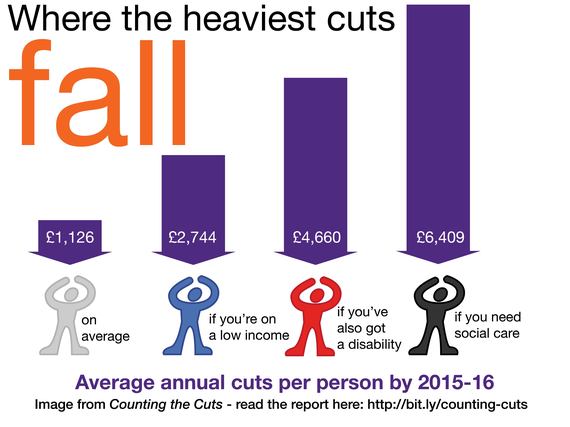
The government is considering ways of reducing eligibility criteria for the daily living component of Personal Independence Payment (PIP) by narrowing definitions of aids and appliances. Other suggestions for cuts include:
- Targeting resources through a lump sum payment for claimants who meet or exceed the eligibility point threshold for the daily living component but score all of their points from aids and appliances. The value of this lump sum could be less than the cumulative value of the equivalent monthly payments. It could be discretionary and could be restricted, for example through the use of vouchers. It would not act as a passport to any other benefit or benefit premia and would not exempt claimants from the benefit cap.
- A monthly payment below the equivalent weekly rate for claimants who meet or exceed the eligibility point threshold for the daily living component, at either rate, but score all of their points from aids and appliances. Again, this payment would not act as a passport to any other benefit or benefit premia and would not exempt claimants from the benefit cap.
- A new condition of entitlement that claimants must score some points from a descriptor that does not relate to aids and appliances.
The government are conducting a consultation and invite views from all interested parties, especially disabled people and disability organisations.
The Department for Work and Pensions reviewed a sample of 105 cases of people who had scored all, or the majority, of their points for PIP due to aids and appliances, in order to assess the extent to which the award may reflect extra costs.
So, the review of just 105 claims has led the government to conclude that PIP doesn’t currently fulfil the original policy intent, which was to cut costs and “target” the benefit to “those with the greatest need.”
That basically meant a narrowing of eligibility criteria for people formerly claiming Disability Living Allowance, previously, increasing the number of reassessments required, and limiting the number of successful claims. Prior to the introduction of PIP, Esther McVey stated that of the initial 560,000 claimants to be reassessed by October 2015, 330,000 of these are targeted to either lose their benefit altogether or see their payments reduced.
I’m just wondering where the ever-reductive quest for the ever-shrinking category of “those with the greatest need” will end.
The PIP assessment currently examines an individual’s ability to complete ten daily living activities and two mobility activities. Regular reviews were also introduced by the last government to ensure that claimants continue to receive the “right level of support.”
The government now say that the proportion of people awarded the daily living component of PIP, who scored all of their points because they need aids and appliances, has more that tripled, from 11 per cent in April 2014 to 35 per cent in 2015.
This increase has largely been driven by a significant and sustained rise in relation to activities one, four, five and six: preparing food, washing and bathing, dressing and undressing, and managing incontinence and toileting. Around three-quarters of those who score all of their points through needing aids and appliances score the minimum number of daily living points needed to qualify for the standard rate of the daily living component.
The government claim that evidence presented to the review suggested that in some instances points were being awarded “… because claimants chose to use aids and appliances, rather than needed them.” And noted that in many cases “ these were non-specialised items of very low cost.”
However, it’s very difficult to justify cutting support for people who require aids to meet fundamental needs such as preparing food, dressing, basic and essential personal care and managing incontinence.
The government also say:
“The results of the review suggest that significant numbers of people who are likely to have low or minimal additional costs are being awarded the daily living component of the benefit solely because they may benefit from aids and appliances across a number of the activities, despite the relatively low point score awarded for them.
In addition to this, recent judicial decisions, based on the current legislation, have broadened the scope of aids and appliances to include articles, such as beds and chairs, which are unlikely to be a reliable indicator of extra costs.
These developments are inconsistent with the original policy intent of awarding the benefit to claimants with the greatest need. We have therefore decided to consult on how aids and appliances are taken into account when determining entitlement to the daily living component.”


Reblogged this on jaynelinney and commented:
The Importance of this consultation is – it SHOWS how Tory #Austerity CUTS Impact on those in MOST NEED
LikeLiked by 1 person
Reblogged lovely – will also share xx
LikeLiked by 1 person
I tryed ho apply for pip coz I got angina and been turned down. Can’t work coz my attack can get quite bad
LikeLiked by 1 person
Reblogged Sue on Britain Isn’t Eating.
Thanks for allowing us to share this post.
https://a6er.wordpress.com/2016/01/10/consultation-as-government-seek-to-limit-disabled-peoples-eligibility-for-personal-independence-payment-politics-and-insights/
LikeLiked by 1 person
This is horrific… I read about the descriptor change re the aids a couple of weeks ago and couldn’t believe it!! Are they actually planning on going through with this?! Pfffftttt…
Zoe
LikeLiked by 1 person
Probably. Previous consultations have not been taken into account by this government – the mandatory reconsideration consultation is one I remember well. Many of us raised our concerns, which were completely ignored. However, it is still important to respond to consultations, we will at least have a record of evidence that this government have ignored democratic process and been unresponsive to concern and criticism.
LikeLiked by 2 people
Reblogged this on lawrencerowntree.
LikeLiked by 1 person